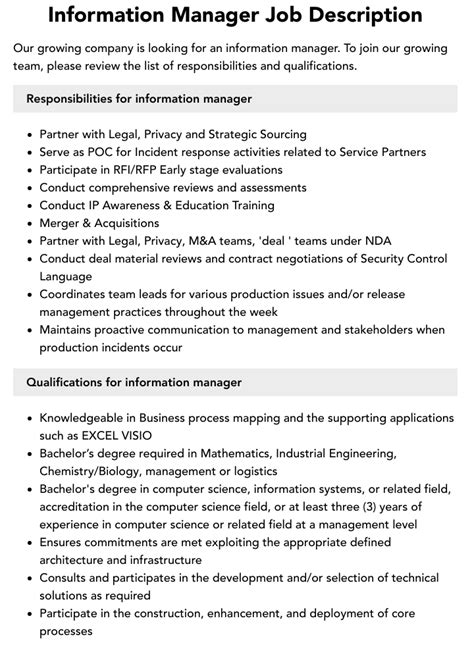In today’s data-driven world, the demand for professionals with expertise in information management is soaring. These individuals play a crucial role in organizing, analyzing, and securing the vast ocean of data that modern businesses generate. With a projected job growth rate of 8%, according to the Bureau of Labor Statistics, information management offers promising career prospects for those looking to enter this dynamic field.

Types of Information Management Jobs
The information management landscape encompasses a wide range of job roles with varying responsibilities and skill sets. Here are some of the most common positions:
- Information Architect: Designs and organizes website and intranet content for optimal user experience.
- Records Manager: Manages the creation, storage, retrieval, and destruction of business and legal records.
- Data Analyst: Collects, analyzes, and interprets data to identify trends, patterns, and insights.
- Information Security Analyst: Protects data from unauthorized access, use, disclosure, disruption, modification, or destruction.
- Database Administrator: Installs, configures, and maintains database systems to ensure optimal performance and data integrity.
- Information Governance Specialist: Develops and enforces policies and procedures that govern the creation, use, and disposition of information.
- Knowledge Manager: Identifies, captures, shares, and manages organizational knowledge to improve decision-making and innovation.
Skills and Qualifications for Information Management Jobs
Individuals seeking to pursue an information management career should develop a strong foundation in the following areas:
- Database management and data analysis techniques
- Information technology and computer science principles
- Information architecture and user experience design
- Records management and compliance
- Information security and risk management
- Project management and stakeholder engagement
Most entry-level information management roles require a bachelor’s degree in information management, computer science, or a related field. Master’s degrees or certifications in these areas can enhance career advancement opportunities.
Career Path and Salary Expectations
Career paths in information management typically progress from entry-level positions to managerial or leadership roles. With experience and additional certifications, individuals can advance to become Chief Information Officers (CIOs), Information Security Managers, or Data Analytics Directors.
According to Salary.com, the average annual salary for Information Management professionals in the United States ranges from $75,000 to $120,000. However, salaries can vary significantly depending on experience, industry, and location.
Emerging Trends and Innovations in Information Management
The information management field is constantly evolving, with new technologies and practices emerging to address the challenges of the data explosion. Here are some of the key trends and innovations to watch:
- Artificial Intelligence (AI) and Machine Learning (ML): AI and ML algorithms are being used to automate tasks, improve data analysis, and enhance decision-making.
- Cloud Computing: Cloud-based storage and computing solutions are providing cost-effective and scalable ways to manage large volumes of data.
- Blockchain Technology: Blockchain technology is being explored as a secure way to store and manage data in distributed, tamper-proof systems.
- Augmented Reality (AR) and Virtual Reality (VR): AR and VR technologies are being used to visualize and interact with data in immersive environments.
- Data Governance: Organizations are increasingly implementing data governance frameworks to ensure the quality, security, and ethical use of data.
Tips and Tricks for Success in Information Management Jobs
- Embrace lifelong learning: The information management field is constantly changing, so it’s crucial to stay up-to-date with the latest technologies and best practices.
- Build a strong network: Connect with other information management professionals at industry events and conferences to expand your knowledge and career prospects.
- Obtain certifications: Industry certifications such as the Certified Information Management Professional (CIMP) demonstrate your expertise and credibility.
- Develop soft skills: In addition to technical skills, soft skills such as communication, problem-solving, and teamwork are essential for success in information management.
- Think strategically: Information management goes beyond data management. It involves understanding the business context and using data to drive decision-making and improve outcomes.
Common Mistakes to Avoid in Information Management Jobs
- Lack of data literacy: Data literacy is crucial for information management professionals to effectively interpret, analyze, and communicate data insights.
- Data overload: Trying to manage too much data without proper organization and analysis can lead to information overload and missed opportunities.
- Security breaches: Failure to implement robust security measures can result in data breaches and reputational damage.
- Ignoring data quality: Poor data quality can lead to inaccurate analysis and flawed decision-making.
- Underestimating the importance of data governance: Data governance is essential to ensure that data is used ethically and for legitimate purposes.
Conclusion
Information management plays a vital role in the success of modern organizations by providing insights, improving decision-making, and ensuring data security. With a growing demand for skilled professionals, information management offers rewarding and challenging career opportunities for individuals with the right skill set and dedication to continuous learning. By embracing new technologies, fostering collaboration, and implementing best practices, information management professionals can drive innovation and contribute to the success of their organizations.
